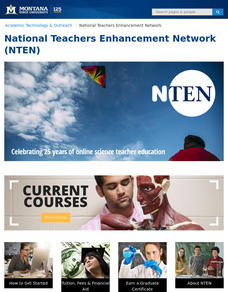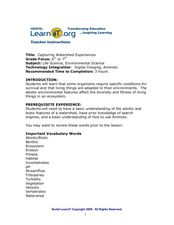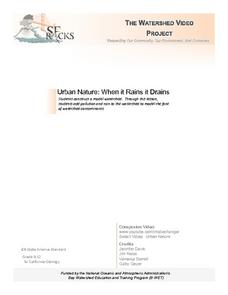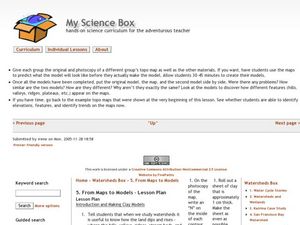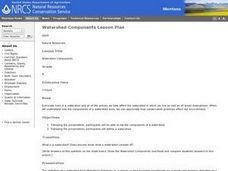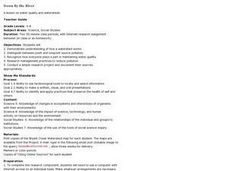Curated OER
Exploration Watershed
Students discuss what a watershed is, and locate watersheds on a map. For this watershed lesson, students use the information they have been introduced to and create a color coded watershed map of their own.
Curated OER
Watersheds and Wetlands
Young scholars investigate watersheds and wetlands. For this watersheds and wetlands lesson, students complete a 17 step lesson plan to build a watershed. Young scholars then complete another 9 step lesson to build a watershed with...
Curated OER
Be a Watershed - Create a Living River
Learners investigate water ways by conducting an experiment with classmates. In this natural resources instructional activity, students define a watershed and identify where large ones are located within the United States. Learners...
Curated OER
There's a Watershed in my Backyard!
Students explain what the term watershed is by creating a model. In this science, geography lesson, students demonstrate how the water moves in a watershed. Additionally, students learn about point source and nonpoint source pollution....
Curated OER
What is a Watershed?
Learners create a classroom size model of a landscape to define the concept of a river watersheds. They spread crumbled newspapers around the floor to simulate different elevations then cover the whole landscape with a sheet. They pour...
Environmental Protection Agency (EPA)
Teachers' Guide to Using A Day In the Life of a Drop
Hydrology hopefuls learn about their local watershed. Through discussion and online interactives, they see that their habits affect the water supply. The lesson concludes with a pledge to filter out bad water usage habits. It makes a...
Curated OER
Stream Quality Assessment
Students investigate many of the factors that affect water quality. They take measurements and water samples at a local stream and evaluate the health of their community's watershed. They write a report detailing their findings.
Curated OER
Capturing Watershed Experiences
Students observe organisms found in the water. In this lesson on organisms, students collect water from local streams and tributaries in order to study the organisms found in the water. As a culminating activity, students create a...
Curated OER
When It Rains it Drains
Students examine the major paths of water on the Earth's surface, and to investigate the many factors that contribute to those paths. Students demonstrate their understanding of a watershed by identifying the defining features of a...
Curated OER
From Maps to Models
Students explore watersheds through the use of a topographic map. They observe topographical maps and discuss their characteristics. In groups, students create a model clay island and make a topographical map of it. Afterward, groups...
Curated OER
Watershed Management
Learners investigate the concept of a watershed. They conduct research into the concept using a variety of resources. Students take a field trip to a local watershed to make observations. The outcome is a report concerning the outside...
University of Florida
Protecting Our Water Resources
Teach young environmentalists to protect their planet's resources with a set of interactive experiments. Kindergartners and other youngsters learn about watersheds and the water cycle, while older elementary learners focus on fertilizer...
Curated OER
Watershed Tourist
Young scholars recognize and categorize different bodies of water. In this watershed and water environments instructional activity, students "Follow the Water from Brook to Ocean." Young scholars define the different bodies of water and...
Curated OER
Watershed Awareness
Students investigate the relationship between upstream influences in their watershed and the watershed's estuary. They apply the scientific process to test a hypothesis while examining the impact of upland activities on estuaries.
Curated OER
Marine & Aquatic Habitats -- Journey of a Drop of Water Through a Watershed
Students discuss pollution and the steps in the hydrologic cycle. They follow a drop of water through a watershed simulation. They discover the components of a water cleaning system as well.
Curated OER
Watersheds
Young scholars discover the importance of watersheds and how they impact other bodies of water. Using a map, they identify and analyze a watershed in their local area and evaluate the health of the water nearby. In groups, they plan...
Curated OER
What is a Watershed, Anyway?
Students constrct a watershed and write about their observations. Students use maps to locate their area in relation to the watershed and inquire about what is applied to the ground above.
Curated OER
A Living Watershed
Students, through this series of lessons, use local resources, speakers, print and video materials, as well as standard text materials to study the ecosystem of the local watershed.
Curated OER
Watershed Delineation
Students use topographic maps to delineate a watershed.In this ecology lesson, students draw the boundaries of a watershed onto a map using contour lines as a guide. Their resulting maps are used to evaluate their understanding.
Curated OER
Watershed Components
Eighth graders examine the components of a watershed. They view overheads, discuss the hydrologic cycle, and observe a demonstration of a soil erosion box.
Curated OER
Watershed Analysis
Students conduct a regional watershed analysis of an area of their choosing. Using on-line data and their personal knowledge of the area, they determine the annual hydrologic budget and teach the class about "their" watershed.
Curated OER
The Water Cycle and Watershed
Learners summarize the steps in the water cycle. In this earth science lesson, students create a skit, song or poem showing the various components of the cycle. They identify the different watersheds in their area.
Curated OER
Exploring Our Watershed System
Students examine how watershed systems are made up, and visit the Susquehanna watershed system and map out the system. They evaluate the order of watercourses in their area.
Curated OER
Down By the River
Students examine how watersheds work and determine the difference between point and nonpoint source pollution. They research management practices to reduce pollution and investigate how everyone can participate in reducing water pollution.








